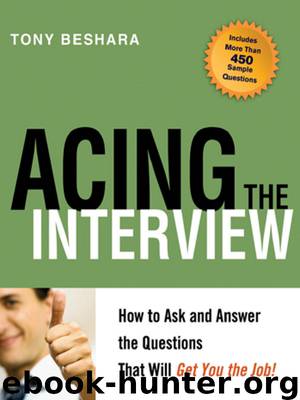Acing the Interview by Tony Beshara

Author:Tony Beshara
Language: eng
Format: epub
Tags: BUS012000, BUS037020, BUS037020
ISBN: 9780814409527
Publisher: Amacom
Published: 2008-01-22T16:00:00+00:00
Chapter
9
Are You a Risk?
These are going to be the most difficult questions you will be asked. They’re going to encroach on your character, your judgment, and the quality of your decisions, both personally and professionally. Of course, the truth is that everyone is a risk. Everyone who has ever been hired is a risk. The real question imbedded in this subject is, “What kind of risk are you?” And along with that, “Am I, as a hiring authority, willing to run the risk and put my reputation on the line with this person?”
A hiring authority is trying to minimize risk and maximize a return on investment. It’s a tradeoff. A hiring authority wants to minimize his or her risk but get as many benefits as possible from hiring someone. The greater the risks you might present, the more they have to be offset by a greater reward. With every risk you present, and you know exactly what they are, you have to offset those risks with the benefits you can provide. The greater the benefits you can demonstrate and the more risks you can mitigate in your being hired, the better chance you have.
Candidates don’t recognize the risks that they present to a prospective employer. In fact, many things that you think are a positive might very well be a big liability. Get your coach to help you recognize what the risks are with hiring you. Then, be ready for the questions.
Are You Going to Be a Long-Term Employee or Will You
Leave Quickly?
• Why do you want to leave where you are? Or, why did you leave your last position? This is one of the biggest “what kind of a risk are we taking” questions you will be asked. The answer to this question is one that will either immediately end the interviewing process for you or enhance the rest of it. This is one of the most crucial questions that you will be asked in every interview. You better have a consistent reason as to why you are looking to leave or why you left your last position; and, as with many other answers, you will need to stick with it. The key to this answer is to be as non–“self-oriented” as you can make it. The major reason that this is an important answer is that the interviewing or hiring authority will assume, just by the nature of his or her relationship with the employee, that you will leave them somewhere down the line for exactly the same reasons that you are leaving where you are now or for the same reason you left your last position. Employers identify with employers.
Being presently employed and looking to leave when you have been employed by that firm for a relatively long period of time, say five years or more, because you are not growing personally or do not have the opportunity to grow beyond your job is a better reason to be leaving than because, for example, new management was coming in and they didn’t really like you.
Download
This site does not store any files on its server. We only index and link to content provided by other sites. Please contact the content providers to delete copyright contents if any and email us, we'll remove relevant links or contents immediately.
| Business School Guides | GMAT |
| Guides | Interviewing |
| Job Hunting | Job Markets & Advice |
| Resumes | Vocational Guidance |
| Volunteer Work |
The Motivation Myth by Jeff Haden(5212)
Audition by Ryu Murakami(4930)
Adulting by Kelly Williams Brown(4574)
The Confidence Code by Katty Kay(4260)
A Mind For Numbers: How to Excel at Math and Science (Even If You Flunked Algebra) by Barbara Oakley(3307)
Waiting in the Wings by Melissa Brayden(3218)
Self-Esteem by Matthew McKay & Patrick Fanning(3144)
Fooled by Randomness: The Hidden Role of Chance in Life and in the Markets by Nassim Nicholas Taleb(3124)
The ONE Thing by Gary Keller(3071)
Nice Girls Don't Get the Corner Office by Lois P. Frankel(3044)
The Dictionary of Body Language by Joe Navarro(2996)
How to be More Interesting by Edward De Bono(2791)
Designing Your Life by Bill Burnett(2746)
Getting Things Done by David Allen(2700)
The Plant Paradox by Dr. Steven R. Gundry M.D(2620)
Police Exams Prep 2018-2019 by Kaplan Test Prep(2548)
What Color Is Your Parachute? 2015 by Richard N. Bolles(2311)
Dangerous Personalities by Joe Navarro(2289)
When to Jump by Mike Lewis(2241)
